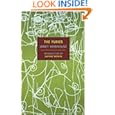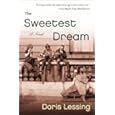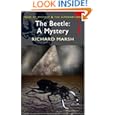Litlove asked me to prepare the next round of possibilites for the Slaves and I present them to you here. I don't believe there's any overriding theme to my selections other than that I'd like to read all of them this year and would love to have some company to discuss them with when I do.
Andrew Crumey's Sputnik Caledonia

One reviewer called this "a kind of post modern, sci-fi Bildungsroman or novel of education." Another compared it to Margaret Atwood's
A Handmaid's Tale.
Sputnik Caledonia's the story of an imaginative kid who wants to become Scotland's first cosmonaut who later finds himself living in a dystopian world with black holes. Crumey won the £60,000 Northern Rock Foundation Writer’s Award for
Sputnik Caledonia. It's yet to be published in the U.S., but it's readily available in paperback via The Book Depository. I have to say it just looks like fun--of the head exploding variety--especially if Stefanie will help us with the physics.
Janet Hobhouse's The Furies

According to the publisher, "The four generations of women described in Janet Hobhouse's autobiographical novel rival the 'Furies' of Greek mythology in their capacity to love and hate with vengeance. At the heart of the story is a mother/daughter conflict that at times revolves around an innocent love affair between romantic co-conspirators and at others is a bitter and deforming contest of wills." Hobhouse died of ovarian cancer while still editing
The Furies. Its been on my tbr list for years.
Doris Lessing's The Sweetest Dream

Doris Lessing substituted
The Sweetest Dream for the third volume of her autobiography, although she claims no parallels to actual people in the novel. London in the 1960s, the nuclear disarmament controversy, contemporary Africa, and, according to reviewer Laura Miller, a merciless detailing of "the hypocrisies and selfishness of the party members and barricade manners" Lessing "knew during her days among Britain's radicals."
Stefan Zweig's The Post-Office Girl
And another NYRB classics reprint, of which the editor says:
The Post-Office Girl is fastpaced and hardboiled—as if Zweig, normally the most mannerly of writers, had fortified himself with some stiff shots of Dashiell Hammett. It's the story of Christine, a nice girl from a poor provincial family who gets a taste of the good life only to have it snatched away; and of Ferdinand, an unemployed World War I veteran and ex-POW with whom she then links up. It's a story, you could say, of two essentially respectable middle-class souls who wake up to find themselves miscast as outcasts, but what it's really about, beyond economic and psychological collapse, is social death. Set during the period of devastating hyper-inflation that followed Austria's defeat in 1918, Zweig's novel depicts a country grotesquely divided between the rich and poor, so much so that it has effectively reverted to a state of nature."
Richard Marsh's The Beetle

This is the wild card of the bunch. I'd never heard of Richard Marsh's
The Beetle before yesterday. A late-Victorian horror novel, it outsold
Dracula in its day and it might be interesting to discuss why the Bram Stoker's become a classic and this one's faded into (no doubt deserving) obscurity. According to Amazon, "From out of the dark and mystic Egypt come The Beetle, a creature of horror, 'born of neither God nor man', which can change its form at will. It is bent on revenge for a crime committed against the devotees of an ancient religion. At large in London, it pursues its victims without mercy and no one, it seems, is safe from its gruesome clutches."
~~~~
Which should be our next selection? Vote for your choice in comments; I'll give everyone a week to make a decision and will announce the results on Wednesday, February 18.
 Stefan Zweig's The Post-Office Girl.
Stefan Zweig's The Post-Office Girl.



